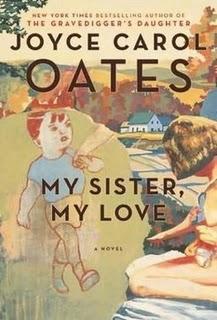My Sister, My Love: The Intimate Story of Skyler Rampike

My Sister, My Love is Joyce Carol Oates’ thirty-fifth novel in forty-five years. Ambitious and sweeping, the nearly 600-page tome explores a plethora of themes: the tabloid press’ obsession with celebrity; marital discord and fidelity; the pressure placed on children by achievement-worshipping parents; forgiving transgressions; the medicalization of normal human development; and the hypocrisy underlying Christian-inspired capitalism, among them.
The story is narrated by Skylar Rampike, a depressed nineteen-year-old whose six-year-old sister, Bliss, was brutally murdered ten years earlier. Bliss, a child-prodigy figure skater, was found in the family’s Fair Lawn, New Jersey home, hanging in the basement boiler room during the Christmas season of 1994. If it sounds familiar, it should. Like a Law and Order episode spun from a lurid news story, My Sister, My Love is a send up of JonBenet Ramsey and her family.
And what a family it is. Betsey is a hover mother of the highest order, hell-bent on making little Bliss a star. It starts serendipitously, when Bliss exhibits an uncanny dexterity that sends her mom into a what-if frenzy. First comes the name change; Bliss’ original name was Edna Louise, after her paternal grandmother, but she was re-christened "Bliss" after Betsey envisioned god instructing her to make the switch. This is followed by hormone injections into Bliss’ child-sized body, regular beauty makeovers to enhance the child’s appearance, and forced practice sessions, even when Bliss is in obvious pain from one or another injury.
While Betsey is over-involved and continually scheming for a place in the spotlight, the family patriarch is the opposite. Named Bix, he is an anti-Semitic womanizer, a politically conservative glad-hander who reveres money and status and is more than happy to keep his family at arm’s length. For his part, Skylar is everything his parents despise, a bookish, non-athletic kid with few friends.
It’s a recipe for trouble and the novel delivers it, in spades. Unfortunately, while there are moments in which the book is affecting, most of the time it falls flat. Among the problems is tone. At times, Skylar is extremely sympathetic—clearly grieving for his sister, tormented by survivor guilt, and filled with fury toward parents who push him out of sight because they are embarrassed by his anti-social mien. At other times, however, the narrator’s snarky voice is distracting. Oates may be trying to replicate the moods of a sullen teen, but like time in the company of a snotty boy-child, one wants to escape him rather than stay in his orbit. What’s more, the many tangents—including hundreds of footnotes meant to elucidate Skylar’s thought processes and intellectual pursuits for the reader—are annoying digressions that make the book longer and more detailed than it needs to be.
Oates is clearly making fun of upper class pretensions and the faux Christian piety and family values endemic to suburban Republicans. It’s a rich playing field, but sadly, My Sister, My Love_ reads like a bloated lecture delivered by a pompous windbag. It’s too bad because real life dramas can be wonderful jumping off points for imagined scenarios. What we get instead is as nauseating as the incessant coverage of celebrity shenanigans we’re continually fed, and we close My Sister, My Love_ feeling no more insight than we had when we picked up the novel for the very first time. It’s a huge disappointment from so gifted a scribe.
This novel was exhausting. I was inspired to check it out anyway, even after reading this review. I've never read anything by Oates, but I do wish I'd started with any other book but this one. I could appreciate the skill it took to write it, but there were too many times when I felt she tried too hard to sound/seem as if she's nineteen years old. The ending was incredible to me, once you get past the novella insert...but it din't redeem much. Will try and brave myself for more Oates in the future, but won't be reading this one again, any time soon.